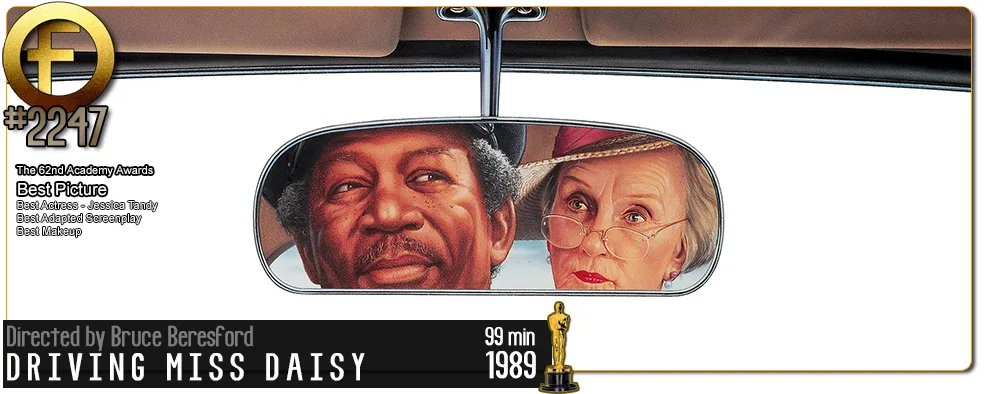Movie Review – Driving Miss Daisy
Principal Cast : Jessica Tandy, Morgan Freeman, Dan Aykroyd, Patti LuPone, Esther Rolle, Joann Havrilla, William Hall Jr, Muriel Moore, Sylvia Kaler, Chrystal R Fox.
Synopsis: An old Jewish woman and her African-American chauffeur in the American South have a relationship that grows and improves over the years.
********
In keeping with the traditional tone of the Academy Awards, there are sure-fire award-bait movies that come along that defy obvious tradition and actually become worthy of the awards they win. These are films that invariably leave an indelible mark, not through grandiose explosions or elaborate special effects, but through the quiet, profound resonance of human connection. Driving Miss Daisy, directed by Bruce Beresford and released in 1989, is one such gem. With two central performances that touch the heart, a beautifully understated score by Hans Zimmer, and a poignant narrative that navigates the complex terrain of racism and bigotry, this film stands as a testament to the enduring power of storytelling. Driving Miss Daisy might be the red-headed stepchild of 80’s Oscar winners, but even now its quiet, unassuming nature and deft emotional soul make this one an understated and oft overlooked classic from one of Hollywood’s more fanciful decades.
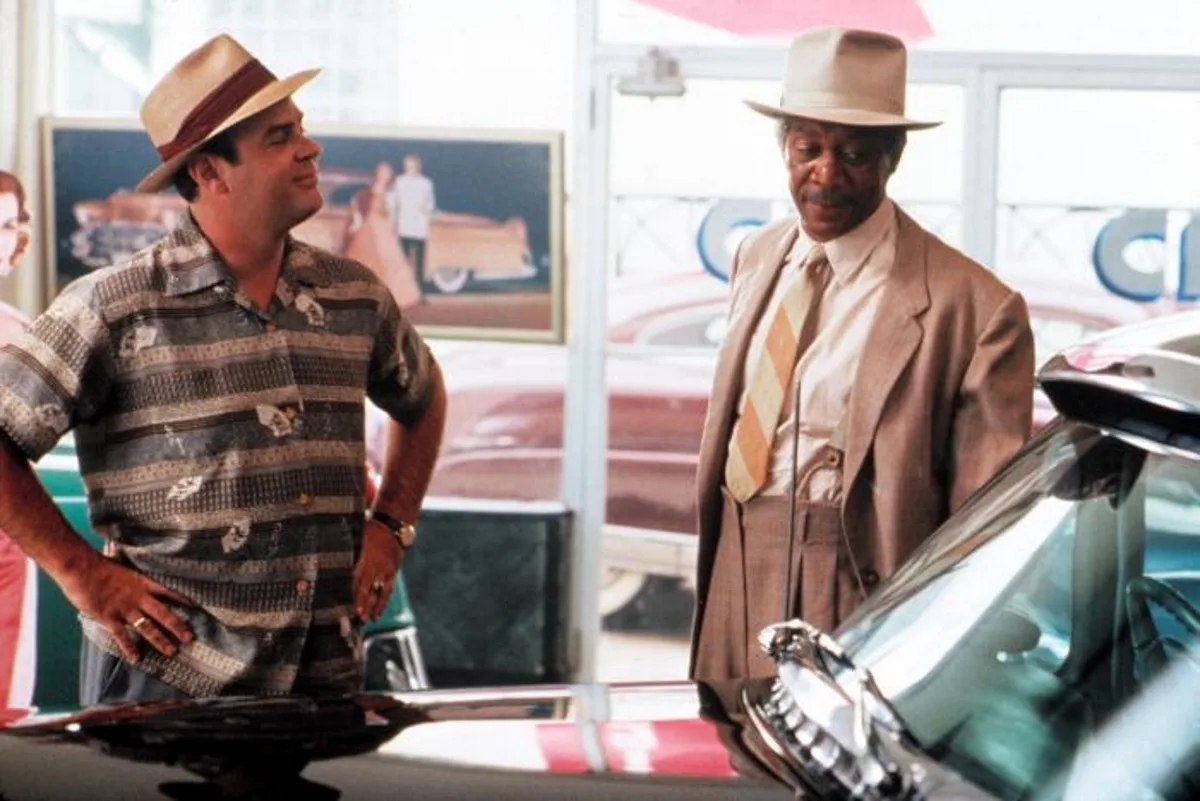
Through Bruce Beresford’s film, we’re introduced to Daisy Werthan (Jessica Tandy), an elderly Jewish widow living in Atlanta, Georgia in the late 1940s. Daisy is a woman of strong convictions, accustomed to her independence and determined to live life on her terms. However, an unfortunate incident involving her car prompts her son, Boolie (Dan Aykroyd), to hire a chauffeur for her. Enter Hoke Colburn (Morgan Freeman), a quiet black man to whom Daisy initially shows disdain and disinterest. As the years pass, however, the pair form a bond forged by communal empathy and affection, turning begrudging employment into a lifelong friendship.
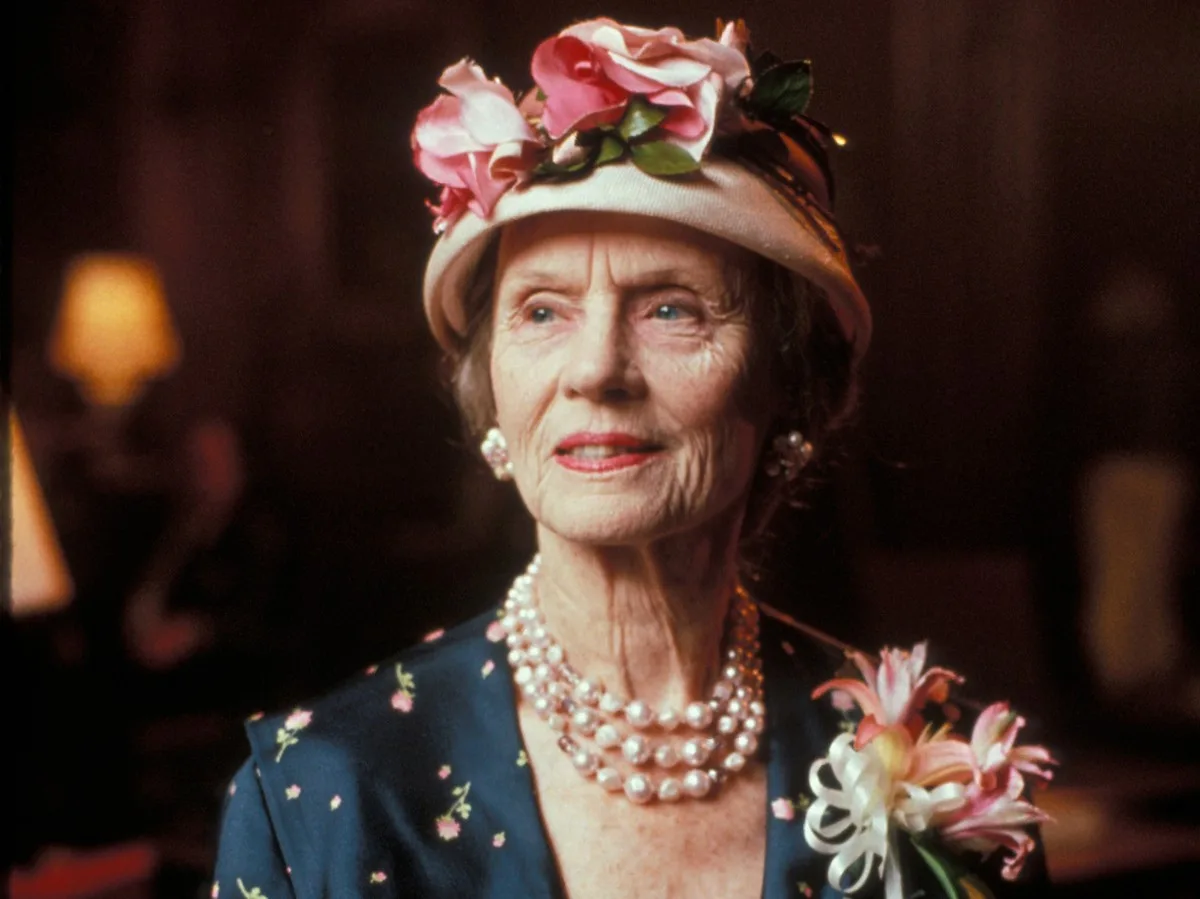
At the core of Driving Miss Daisy are the performances that resonate with authenticity and depth. Jessica Tandy’s portrayal of Daisy Werthan is a testament to her talent and artistry. Tandy infuses Daisy with a blend of vulnerability and resilience that is nothing short of remarkable. Her journey from initial reluctance to eventual acceptance is a masterclass in character development. Morgan Freeman’s Hoke Colburn is a character of profound dignity and grace. Freeman’s performance captures the essence of a man who transcends racial barriers with his humanity and unwavering patience. He provides a perfect counterbalance to Daisy’s initial stubbornness, and their chemistry on screen is a joy to behold. Dan Aykroyd as Boolie Werthan offers a nuanced portrayal of a son caught between his mother’s strong-willed nature and his desire to ensure her well-being. Aykroyd’s performance adds depth to the family dynamics and showcases the complexities of their relationships.

The story of Driving Miss Daisy began its journey as a stage play, debuting in 1987 at Playwrights Horizons in New York City. Alfred Uhry, a talented playwright, penned the narrative, largely inspired by his own family experiences. The play’s focus on the relationship between an elderly Jewish widow and her African American chauffeur in the racially charged American South in the mid-20th century resonated with audiences and critics alike. The play was a hit, and it quickly gained recognition for its exceptional storytelling and the nuanced portrayal of its characters. Morgan Freeman, who would originate the role of Hoke on stage, used this experience to snag the role on screen. while Dana Ivey portrayed Miss Daisy Werthan in the original stage production. Uhry’s screenplay story remained faithful to the play’s core elements, focusing on the evolving friendship between Miss Daisy, a feisty and independent elderly woman, and Hoke, her wise and patient chauffeur. The film beautifully explores themes of race, aging, and the changing dynamics of the American South, all set against the backdrop of a 25-year journey.
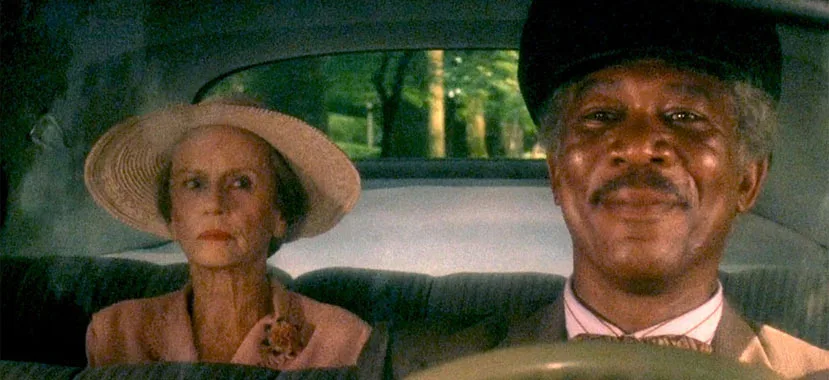
Set in the backdrop of the American South during a time of racial segregation and civil rights struggles, Driving Miss Daisy does not shy away from addressing the themes of racism and bigotry. Daisy’s initial reluctance to have Hoke as her driver is a reflection of the deeply ingrained prejudices of the time. Her scepticism, though born out of ignorance, is an embodiment of the racial divide that plagued the nation. As the narrative unfolds, the film invites us to witness the gradual transformation of Daisy’s views. Her friendship with Hoke transcends societal norms and expectations, serving as a poignant reminder of the power of human connection to bridge the gaps of prejudice. However, it’s essential to acknowledge the potential controversy around the “white saviour” trope indicated in the film. The narrative unfolds primarily from Daisy’s perspective, and her journey of enlightenment can be perceived as a central focus. It’s crucial to view the film with an awareness of this perspective while recognizing that the true heart of the story is the transformation of both Daisy and Hoke. The film doesn’t present Daisy as a saviour, but as someone who evolves through her interactions with Hoke.
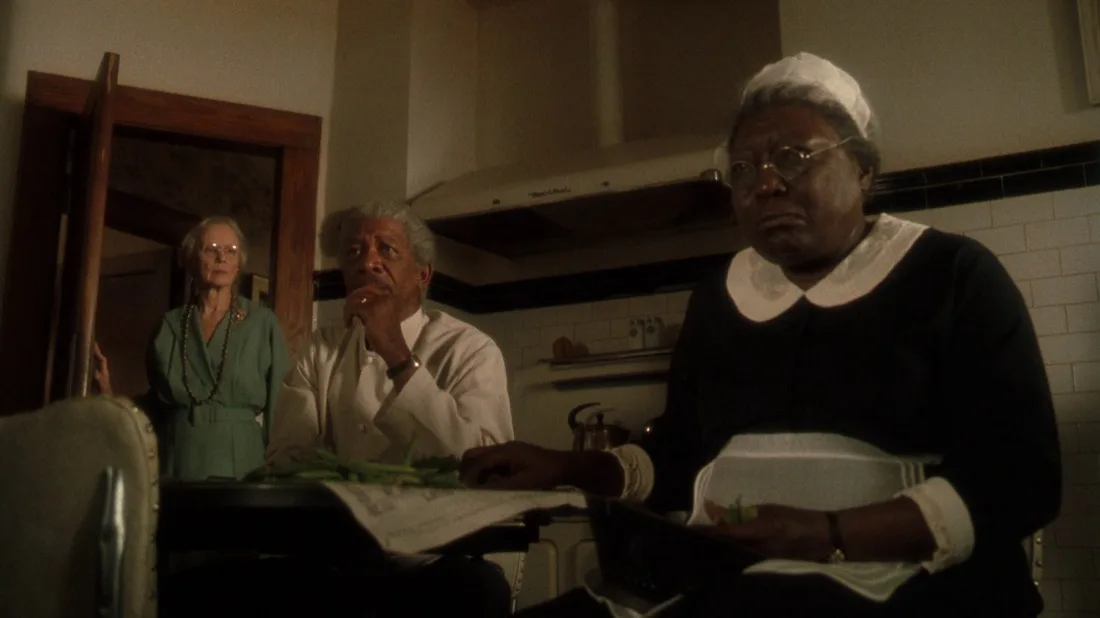
Hans Zimmer, known for his mastery of film scores, weaves a melodic tapestry that enhances the emotional depth of Driving Miss Daisy. Zimmer’s score is a delicate balance of nostalgia and hope, mirroring the evolving relationship between the characters. The music serves as an emotional anchor, guiding the audience through the poignant moments of the film. The score captures the essence of the American South, with its echoes of the past and the promise of a better future. Zimmer’s music becomes a character in its own right, elevating the film to a level of emotional resonance that lingers in the heart long after the credits roll.
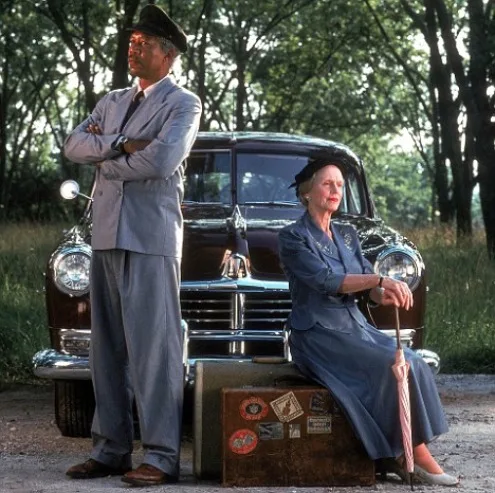
At its core, Driving Miss Daisy is a film about the beauty of human connection that transcends the barriers of race, age, and social class. Daisy and Hoke’s relationship is a testament to the capacity of the human heart to grow, change, and find common ground. The film is a poignant exploration of the isolation that can occur when societal norms and prejudices divide people. It reminds us that genuine friendship can blossom in the unlikeliest of places, and that we all have the capacity to change and evolve if we open our hearts to understanding and empathy. The key element of the film is the relationship between Daisy and Hoke, obviously, but this would be nothing were it not for the palpable screen-chemistry of Freeman and Jessica Tandy. I adore Jessica Tandy in this film, her performance is absolutely shattering at times, and she thoroughly deserved her Best Actress win.
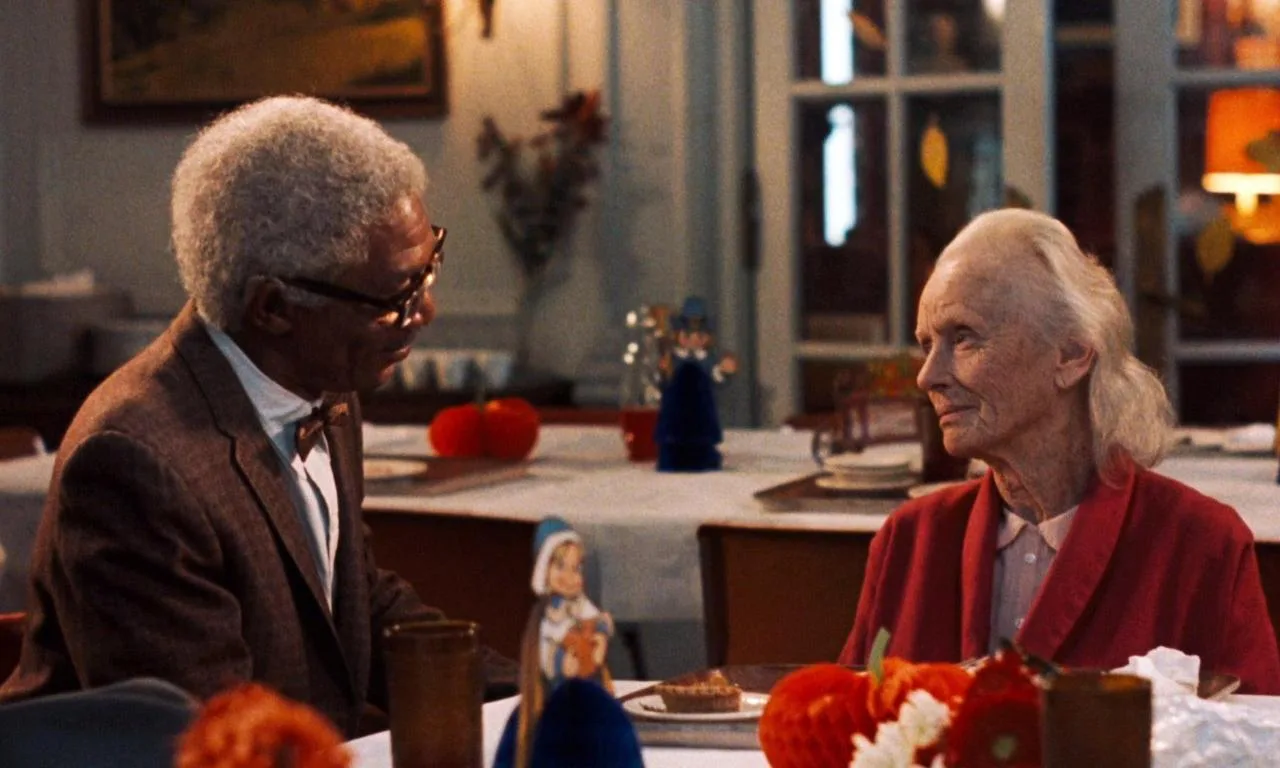
I consider this film a minor masterpiece, one that continues to resonate with its timeless themes of humanity and connection. The performances of Jessica Tandy, Morgan Freeman, and the entire cast are a testament to the depth of character development and storytelling that defines this film. Hans Zimmer’s score provides a melodic backdrop that elevates the emotional depth of the narrative. The film’s exploration of racism and bigotry serves as a stark reminder of the historical struggles that have shaped our society, while also offering a message of hope and transformation. It’s a film that invites us to embrace the beauty of human connection and the capacity of the human heart to change and evolve. In a world often divided by prejudice and ignorance, the film stands as a timeless reminder of the power of friendship and understanding. It leaves an indelible mark on the heart, urging us to drive forward on the road of empathy and compassion. While it may seem trite and cliched today, I still consider Driving Miss Daisy one of my favourite Best Picture winners in the Academy’s history, if only from a purely nostalgic, childhood wonder standpoint.
Note: This review was written by the author with additional material provided by ChatGPT.

